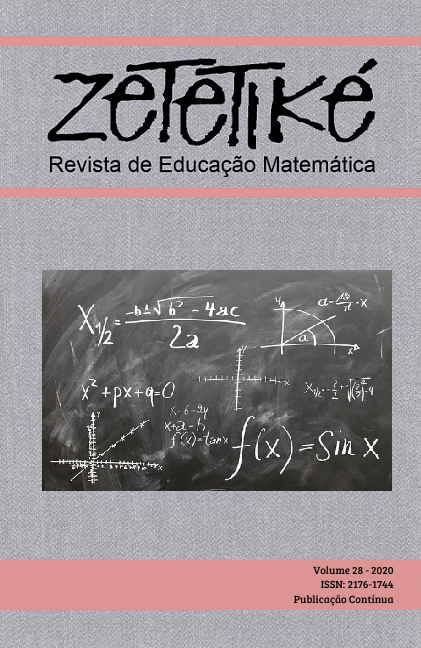Resumo
This study aims to discuss and understand the process of (re)significance of teachers’ professional knowledge based on discussions and reflections carried out by a group of teachers who teach mathematics for the initial years of the elementary education. The teachers studied how to calculate the area of plane figures using squared arrays. This study is based on Zeichner’s and Serrazina’s research to discuss the reflection on the practice and, in Ball, Thames, and Phelps, to analyse the (re) significance of the knowledge of the professionals involved. The data analysed were collected during the group meetings at the school where the participants taught. Through the analyses of the discussions held, we could observe that the teachers expanded their common and specialised content knowledge, mainly in relation to the strategies to calculate area, and started using reconfiguration of the figures and formulas of area more assertively. Mutual support allowed them to identify their own needs and then modify their analyses of the strategies for area calculation to be adopted.
Referências
Ball, D. L., Thames, M. H., & Phekps, G. (2008). Content knowledge for teaching: what makes it special? Journal of Teacher Education, 59(5), 389-407.
Baturo, A., & Nason, R. (1996). Student teachers' subject matter knowledge within the Domain of Area Measurement. Educational Studies in Mathematics, 31(3), 235-268.
Brasil (1997). Ministério de Educação e Cultura. Secretaria de Educação. Parâmetros curriculares nacionais: primeiro e segundo ciclos do ensino fundamental: matemática. Brasília.
Brasil (2018). Ministério de Educação e Cultura. Secretaria de Educação. Base Nacional Comum Curricular. Brasília.
Clements, D. H., & Stephan, M. (2004). Measurement in pre-K to grade 2 mathematics. In D. H. Clements & J. Sarama (Eds.), Engaging young children in mathematics (pp. 299–317). Londres: Lawrence Erlbaum Associates.
Duval, R. (1994) Les différents fonctionnements d'une figure dans une démarche geometric.Repères. IREM, 17, 121-137.
Etcheverria, T. C. (2008). Educação continuada em grupos de estudos: possibilidades com foco no ensino da geometria. Dissertação de Mestrado em Educação em Ciências e Matemática. Porto Alegre: Pontifícia Universidade Católica do Rio Grande do Sul. Disponível em: http://repositorio.pucrs.br/dspace/handle/10923/3006
Garcia Silva, A. F., Galvão, E. E. L., & Campos, T. M. M. (2013). Uma interpretação das estratégias utilizadas por um grupo de professores ao calcular área de polígonos em malha quadriculada. Actas del VII CIBEM (pp. 5.674 – 5681). Madrid, Espanha. Disponível em: http://www.cibem7.semur.edu.uy/7/actas/pdfs/1322.pdf . Acesso em: 14. 10. 2020.
Gimeno Sacristán, J. (2000). O currículo: uma reflexão sobre a prática. 3. ed. Artmed.
Gomes, J.M., Galvão, M.E.L., & Garcia Silva, M.E. (2018). O conceito de área num processo de formação de professores dos anos iniciais. Jornal Internacional de Estudos em Educação Matemática, 11(3), 261-269. Disponível em: https://revista.pgsskroton.com/index.php/jieem/article/view/7060
Serrazina, L. (1999) Reflexão, conhecimento e práticas lectivas em matemática num contexto de reforma curricular no 1.º ciclo. Quadrante, Lisboa, 8(9), 139-167.
Serrazina, M. L. (2012). Conhecimento matemático para ensinar: papel da planificação e da reflexão na formação de professores. Revista Eletrônica de Educação, 6(1), 266-283. http://www.reveduc.ufscar.br/index.php/reveduc/article/view/355
Shulman, L. (1986). Those who understand: knowledge growth in teaching. Educational Researcher, 15(2), 4-14.
Zeichner, K. (1993). Formação reflexiva de professores: ideias e práticas. Lisboa, Educa.
Zeichner, K. M. (2008). Uma análise crítica sobre a “reflexão” como conceito estruturante na formação docente. Educação e Sociedade [online], 29(103), 535-554. http://dx.doi.org/10.1590/S0101-73302008000200012.

Este trabalho está licenciado sob uma licença Creative Commons Attribution-NonCommercial-NoDerivatives 4.0 International License.
Copyright (c) 2020 Zetetike


